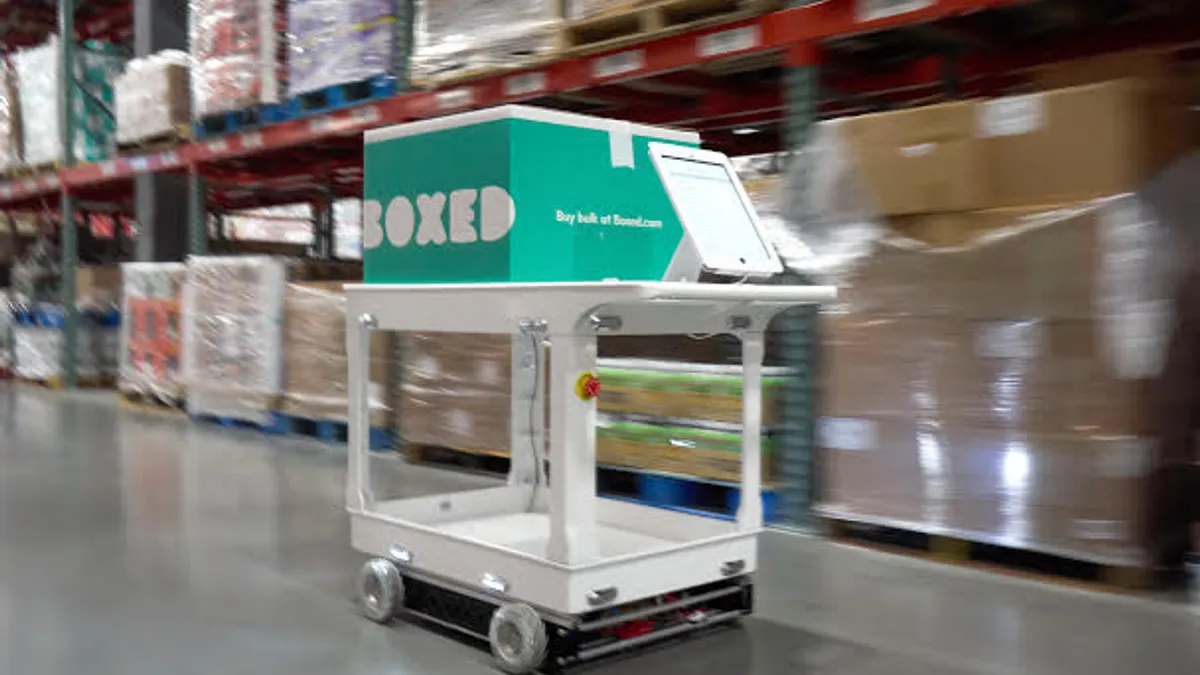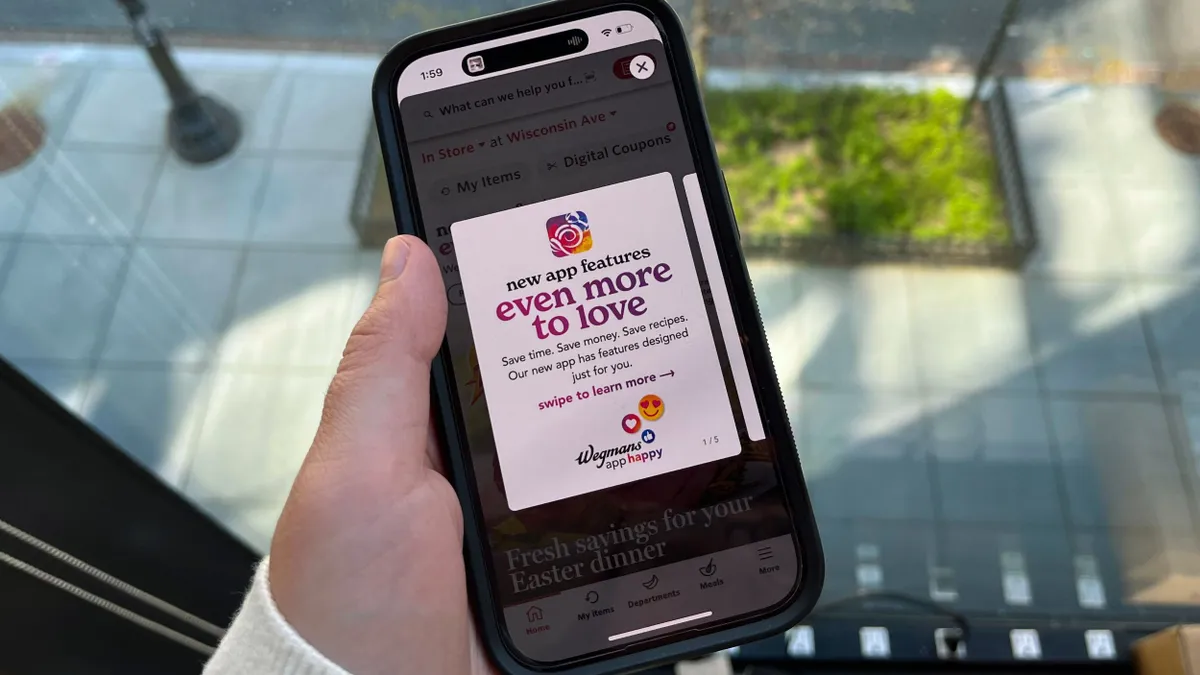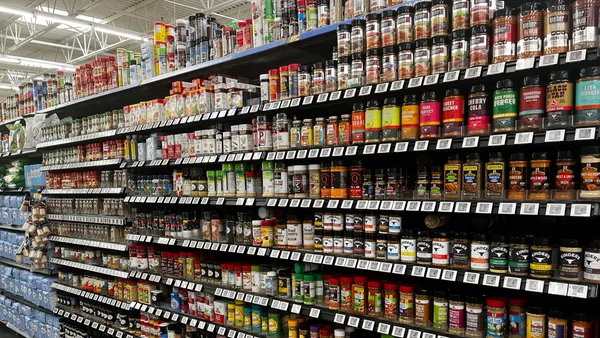Selling bulk quantities of toilet paper and Cheez-Its online is no easy task, but Boxed has had a few fortunate breaks that have lifted the business. Back in 2014, millions of consumers met the company via an endorsement from Kathie Lee Gifford and Hoda Kotb on "The Today Show." Then in 2017, Boxed got on retailers' radars after Amazon's acquisition of Whole Foods raised the value of the digitally savvy startup with warehouses full of proprietary e-commerce technology.
Along the way, Boxed has gotten positive publicity over everything from paying for employees' weddings to an origin story centered on Huang’s parents' garage in New Jersey.
Nearly six years into running the business, CEO Chieh Huang isn't relying on lucky breaks or its reputation as a corporate citizen to take his company to the next level. In an interview with Grocery Dive, he said he's focused on driving sales through a carefully built combination of technology, millennial-friendly marketing and a well-honed warehouse assortment.
"Four to five years was the hard work needed to really build the infrastructure for what we're able to do," Huang said. "Now suppliers are leaning in, retailers are leaning in. I truly believe 2019 will be a breakout year for us."
At a time when established retailers are buying up digital natives, Boxed, with advanced warehouse technology, nimble digital interface and rapid growth with young shoppers has become a prime acquisition target. Last year, several retailers including, reportedly, Amazon and Kroger, made entreaties. Kroger failed with a $400 million bid, according to Bloomberg.
Rather than go the same route as Shipt (acquired by Target in 2017) or Jet (picked up by Walmart in 2016), Boxed is focused on organic growth, Huang said. In August, the company closed $110 million in new funding led by Japanese retailer Aeon Group. According to The New York Times, the deal valued Boxed at $600 million.
Boxed's technology, which Huang and his engineering team built from the ground up, was the selling point for that deal, Huang said, and may represent the company's greatest competitive advantage. This includes order management systems, mobile technology, software that monitors and lists product expiration dates and automated robots that wheel packages around its warehouses. The company's warehouse in Union, New Jersey, is fully automated, with nearly three miles of conveyor belts, driverless carts and a special camera that takes a "selfie" of each order and emails it to its new owner.
"Four to five years was the hard work needed to really build the infrastructure for what we're able to do."

Chieh Huang
CEO, Boxed
Huang told Grocery Dive that building its own technology gives Boxed the flexibility to quickly adjust its operations in line with consumer demand. He declined to share exactly what technology and services Boxed will make available to retailers, and what companies it is currently in talks with.
"The customer is still evolving, but because we built the full fulfillment stack ourselves we can evolve pretty quickly with that," he said.
Private labels and product exclusives
Boxed is known for its pared-down selection of name brand snacks, sodas, multi-packs of toilet paper and boxes of diapers. But the club e-tailer also wants to push into new opportunities, Huang said.
The company's Prince & Spring private label brand comprises 14% of the company's sales and features more than 100 different items. Huang said he'd like to continue to build out the line thoughtfully. Boxed only enters private label categories where it can beat or match national brand competitors, he said, and has no plans to add new store brands.
"Everyone wants to simplify their private brand lines, and so we made the conscious decision to just stick with one [brand] and not need to make the same mistakes as everyone else," he said. "Growing Prince & Spring is a priority for us, but we're not going to be a 70% private label retailer."
Boxed also wants to offer more fresh food to its customers. The company currently offers produce, eggs, milk and other perishables to shoppers in five markets where it currently operates warehouses: Atlanta, Dallas, New Jersey, the New York/New Jersey metro area and Boston. Moving forward, Huang said he plans to expand perishables sales, which encourage loyalty and regular site visits, beyond its warehouse footprint through partnerships with grocery retailers.
Sales to office buildings and other businesses, which make up between 20% and 30% of Boxed's revenue, Huang said, are another growth opportunity. Coffee, he said, has become a given at offices as employers add granola bars, cereal and other consumables for their workers to nosh on.
"The Staples and the Office Depots of the world — they don't have a very robust pantry aisle right now," he said.
In early January, Boxed announced it would become the sole retailer to sell a new line of Smartwater alkaline and antioxidant-enhanced waters. The product exclusive, which lasts until next month, is the first such deal for Boxed, and a sign for Huang that his company has arrived. He said Boxed will "definitely" have more exclusives in the future.
"That's been a wonderful development because for us early on it was hard to even get anyone to call us back," he said. "And as a consumer you also feel like, 'Okay, I'm shopping in the right place.'"
The shadow of Amazon may loom over Boxed and other online retailers, but Huang said there's plenty of room for companies like his. Likewise with competitors like Costco, Sam's Club and Kroger. Although Huang believes Boxed competes with all of them in some ways, he doesn't see that as an impediment to continued growth because his company occupies a profitable niche.
Still, the online club store that started in a New Jersey garage faces growing consumer expectations that have become costly to meet. Amazon Prime, Huang acknowledged, has trained shoppers to expect delivery in two days or less. Ninety-percent of Boxed shoppers get delivery in two days or less, and nearly half get overnight delivery.
"When we started five years ago, two-day delivery was the gold standard, and now it's table stakes," Huang said. "Overnight it's like, okay, you're happy, while same-day is the real surprise and delight. We have to evolve with the consumer. We can always do better."





















